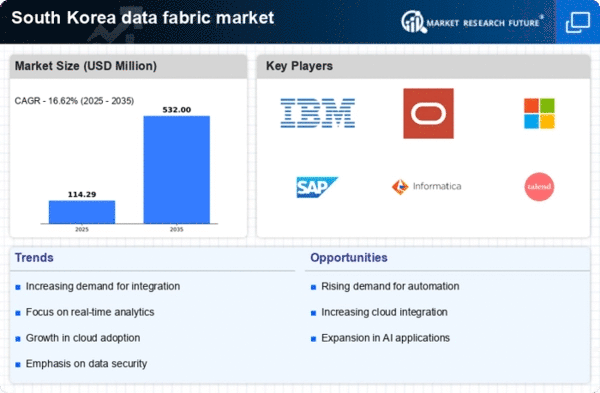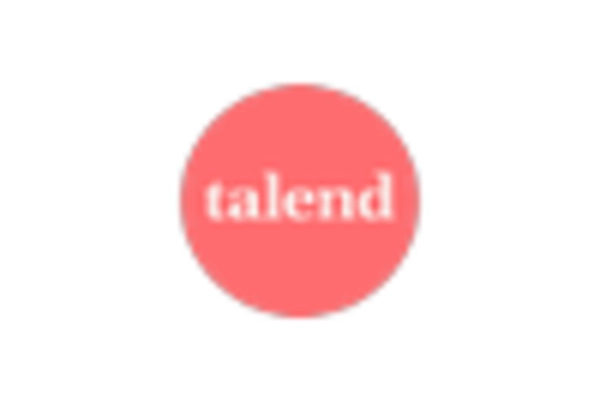Expansion of IoT Ecosystems
The proliferation of Internet of Things (IoT) devices in South Korea significantly influences the data fabric market. As more devices become interconnected, the volume of data generated increases exponentially, necessitating robust data management solutions. The data fabric market is adapting to this trend by offering solutions that can efficiently handle the complexities associated with IoT data streams. It is estimated that the number of IoT devices in South Korea will reach over 30 million by 2026, creating a substantial demand for data fabric technologies that can integrate and analyze diverse data sources. This expansion of IoT ecosystems not only enhances operational capabilities but also drives innovation in data analytics, thereby positioning the data fabric market as a critical enabler of digital transformation.
Increased Focus on Data Security
In South Korea, the data fabric market is witnessing an intensified focus on data security and privacy. With the rise in cyber threats and stringent regulations surrounding data protection, organizations are compelled to adopt comprehensive data management strategies. The data fabric market is responding by providing solutions that prioritize security features, such as encryption and access controls. Recent surveys indicate that approximately 70% of businesses in South Korea consider data security a top priority when selecting data management solutions. This heightened awareness is likely to drive growth in the data fabric market, as companies seek to ensure compliance with regulations while safeguarding sensitive information. As a result, the data fabric market is expected to evolve, incorporating advanced security measures to meet the demands of a more security-conscious landscape.
Growing Need for Data Integration Solutions
The data fabric market in South Korea is significantly influenced by the growing need for effective data integration solutions. As organizations increasingly rely on multiple data sources, the complexity of managing and integrating this data becomes a pressing challenge. The data fabric market is addressing this need by offering solutions that facilitate seamless data integration across various platforms and environments. Recent studies suggest that nearly 60% of South Korean enterprises face difficulties in integrating data from disparate sources. This challenge presents an opportunity for the data fabric market to provide innovative solutions that streamline data workflows and enhance data accessibility. As businesses strive for a unified view of their data, the demand for integration solutions is likely to propel the growth of the data fabric market in the coming years.
Rising Demand for Real-Time Data Processing
The data fabric market in South Korea experiences a notable surge in demand for real-time data processing capabilities. Organizations are increasingly recognizing the necessity of accessing and analyzing data instantaneously to make informed decisions. This trend is particularly evident in sectors such as finance and telecommunications, where timely insights can lead to competitive advantages. According to recent estimates, the market for real-time data processing solutions is projected to grow at a CAGR of approximately 25% over the next five years. This growth is likely to drive investments in data fabric technologies, as businesses seek to enhance their operational efficiency and responsiveness. Consequently, the data fabric market is poised to benefit from this rising demand, as companies prioritize solutions that facilitate seamless data integration and real-time analytics.
Emergence of Advanced Analytics Capabilities
The emergence of advanced analytics capabilities is reshaping the data fabric market in South Korea. Organizations are increasingly leveraging analytics to derive actionable insights from their data, driving the need for sophisticated data management solutions. The data fabric market is adapting to this trend by incorporating advanced analytics features, such as predictive modeling and machine learning algorithms. It is projected that the analytics market in South Korea will reach approximately $2 billion by 2027, indicating a robust demand for data fabric technologies that support these capabilities. This shift towards advanced analytics not only enhances decision-making processes but also fosters innovation across various sectors. Consequently, the data fabric market is likely to experience significant growth as businesses seek to harness the power of data-driven insights.
















